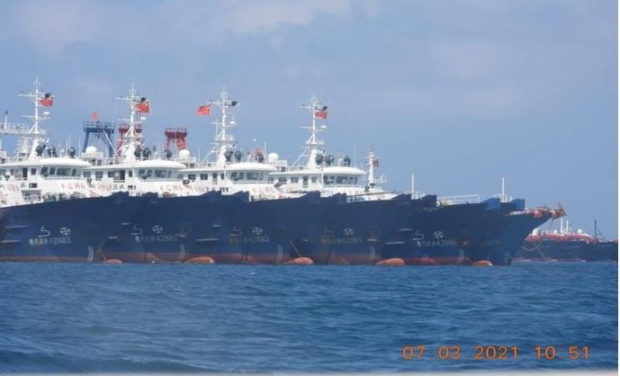Lacson asks DFA: What happened to 200 diplomatic protests vs China?

Some of the about 220 Chinese vessels reported by the Philippine Coast Guard, and believed to be manned by Chinese maritime militia personnel, are pictured at Whitsun Reef, South China Sea, March 7, 2021. Picture taken March 7, 2021. Philippine Coast Guard/National Task Force-West Philippine Sea/Handout via REUTERS.
MANILA, Philippines — What did the Philippines get after filing over 200 diplomatic protests against China for its intrusion in the West Philippine Sea?
That was the question raised by Senator Panfilo Lacson to the Department of Foreign Affairs (DFA) on Monday, as the Senate foreign relations committee tackled Senate Bill No. 2289 or the Maritime Zones Act.
According to DFA Deputy Assistant Secretary Myca Magnolia Fischer, 241 protests have been sent out, including 183 in 2021 alone amid China’s entry into waters near Pag-asa Islands and the Julian Felipe Reef.
However, when Lacson asked what the diplomatic protests did, Fischer appeared to point towards a long-term effect.
“And ano ‘yong nakuha natin, ano ‘yong napala natin? Any positive outcome?” Lacson asked.
“Well it is part of political and legal warfare so to speak, but of course we have also received a response from the Chinese side, they are reiterating their position but the filing of diplomatic protest has significance politically and legally,” Fischer, who heads the DFA’s Office of Asian and Pacific Affairs, said in reply.
On the question of how the diplomatic protests would be able to help the country’s cause in the WPS, given that China has been aggressive in asserting its claims over the disputed region, Fischer said that it would be used as a basis that the country did not just sit idly amidst China’s intrusive activities.
“Perhaps in the future we may consider future actions, and then we cannot be accused of estopping, so that’s why sir we continue to express our protests to their incursion in our territory, our sovereignty, and our sovereign rights. We need to be a persistent objector,” Fischer said.
However, the senator noted that the diplomatic protests can be considered like documents “for future reference” — as it did not have any immediate positive output considering that China remained adamant about claiming parts of the West Philippine Sea (WPS).
“In other words, ito ‘yong for future reference, ‘yon lang ‘yong na-achieve natin? In so many words, for future reference. No immediate positive outcome but at least we look forward to something positive in the future, it may be not in the near future but in the future, baka d’yan natin makita ‘yong positive outcome ng mga pina-file nating diplomatic protests. Is that correct?” Lacson asked.
“So no matter what, we will not get tired of filing diplomatic protests, if need be,” Lacson added, to which Fisher agreed.
Fischer however got an ally in retired Ambassador Gilberto Asuque, who noted that refraining from filing diplomatic protests might lend the idea that the Philippines is tacitly in agreement with what China does in the West Philippine Sea.
Asuque, who used to be the country representative to the International Maritime Organization, said that it also reinforces the country’s stand that the WPS does not belong to China.
“We have to be a persistent objector in order not to put in place what is called an erga omnes or where actions because custom in international law because no one objects to it,” Asuque told Lacson.
“We have to continue doing that. Now as to its effect, the most important effect on that Mr. Senator is really to counter China, that they have no right in the West Philippine Sea,” he added.
Asuque even suggested that the country, if it decides to provide the international community a copy of the diplomatic protests it filed against China, should include all documents submitted since 1995 — or the year when China allayed fears about building a military site on disputed islands over the WPS.
“It is important we continue to file diplomatic protests. Perhaps the DFA could include the number of protests signed and sent by the Philippines to China starting from 1995 when China set-up what it called just a fisherman’s shelter. And all of these diplomatic protests were incorporated in the decision of the arbitral award. We need to continue the diplomatic protests,” he explained.
The Senate is tackling a bill that would provide the government a map that defines the country’s maritime zones — similar to what China did with its nine-dash line claim that actually encompasses part of the West Philippine Sea.
The hearing was held weeks after the Chinese Coast Guard vessels blocked and water cannoned boats from the Philippines near Ayungin Shoal.
According to reports, several local boats were in a resupply mission to BRP Sierra Madre, a ship grounded at the Ayungin Shoal. The shoal is within the country’s exclusive economic zone (EEZ), which the 2016 Permanent Court of Arbitration (PCA) decision said the Philippines has exclusive rights to.
In effect, the PCA ruling said that China’s nine-dash line has no legal and historical basis.














